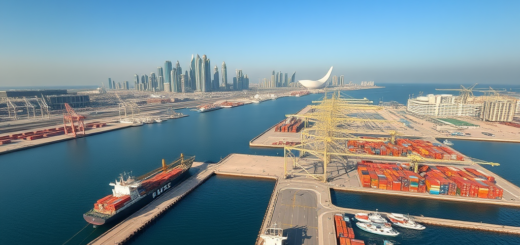The Future of Green Business Practices in Dubai
The future of green business practices in Dubai is bright and promising, driven by the city’s ambition to become a global leader in sustainability. As the UAE continues to diversify its economy beyond fossil fuels, businesses in Dubai are increasingly recognizing the importance of adopting eco-friendly practices. This not only enhances their corporate image but also aligns with global trends toward environmental responsibility. Companies that embrace green principles can benefit from cost savings, improved efficiency, and access to a growing segment of environmentally-conscious consumers. This article explores the future landscape of green business practices in Dubai, examining key trends, initiatives, and the role of technology in promoting sustainable growth.
Emerging Trends in Green Business Practices

As Dubai positions itself at the forefront of sustainability, several trends are shaping the green business landscape. These trends not only reflect the local culture and regulatory environment but also align with global sustainability goals. Here are some of the key trends:
- Increased Renewable Energy Adoption: Businesses are investing in solar energy solutions, capitalizing on Dubai’s abundant sunlight.
- Energy Efficiency Standards: New building regulations are mandating energy-efficient designs and technologies.
- Sustainable Supply Chain Practices: Companies are focusing on sourcing sustainable materials and reducing their carbon footprints.
- Waste Reduction Initiatives: Businesses are exploring innovative ways to minimize waste, such as recycling and upcycling.
- Corporate Social Responsibility (CSR): Companies are integrating sustainability into their core missions and engaging with local communities.
Technology plays a pivotal role in enabling green business practices in Dubai. Innovations in technology not only enhance the efficiency of operations but also provide businesses with the tools needed to monitor and reduce their environmental impact. Key technological advancements include:
- Smart Grids: These enhance energy distribution and help businesses optimize their energy consumption.
- IOT Devices: Internet of Things (IoT) devices facilitate real-time monitoring of resource usage, enabling companies to make data-driven decisions.
- Clean Production Technologies: Advanced manufacturing techniques reduce waste and energy consumption.
- Green Apps: Mobile applications that promote sustainable practices and educate users on environmental issues.
Government Initiatives Supporting Green Business

The Dubai government has launched a variety of initiatives aimed at promoting green business practices. These initiatives provide a framework for companies to align with sustainability goals while benefiting economically. Noteworthy initiatives include:
- Dubai Clean Energy Strategy 2050: Aiming to make Dubai a global center for green economy and ensure that 75% of the emirate’s total power output comes from clean energy sources by 2050.
- The Dubai Green Building Code: Mandating sustainable construction practices to enhance energy efficiency.
- Incentives for Green Technologies: Financial incentives and support for businesses that adopt sustainable technologies.
- Climate Action Plan: A comprehensive framework to achieve sustainability objectives and reduce greenhouse gas emissions.
- Partnership with the Private Sector: Collaborations aimed at fostering innovation in green technologies.
Challenges in Implementing Green Business Practices
While the future of green business practices in Dubai appears promising, several challenges persist. Understanding and overcoming these hurdles is essential for achieving meaningful results. Some of the challenges include:
- High Initial Costs: The upfront investment for green technologies can be a barrier for many businesses.
- Lack of Awareness: Some companies struggle to find resources or knowledge on how to implement sustainable practices effectively.
- Regulatory Hurdles: Navigating the often-complex regulations related to environmental practices can be daunting for businesses.
- Market Readiness: The demand for green products and services is still developing, influencing the business case for sustainability.
Conclusion
As Dubai moves forward into a future defined by sustainability, green business practices are becoming increasingly integral to the city’s economic development. The convergence of government initiatives, technological advancements, and growing consumer demand signals a transformative era for businesses in the region. While challenges remain, the commitment to green practices offers significant advantages that pave the way for a more sustainable and prosperous Dubai. By actively engaging with sustainability initiatives, Dubai’s businesses can not only contribute to environmental goals but also enhance their market competitiveness in an evolving global economy.
Frequently Asked Questions
1. What are green business practices?
Green business practices refer to strategies and operations that minimize negative impacts on the environment. This includes sustainable sourcing, energy efficiency, reducing waste, and increasing recycling efforts.
2. How is Dubai promoting green businesses?
Dubai promotes green businesses through various government initiatives, such as the Dubai Clean Energy Strategy 2050 and the Dubai Green Building Code, which support sustainable practices and provide incentives for adopting green technologies.
3. What challenges do businesses face when implementing green practices in Dubai?
The main challenges include high initial costs, lack of awareness or expertise, regulatory hurdles, and limited market readiness for green products and services.
4. How does technology support green business practices?
Technology supports green practices by enhancing energy efficiency, enabling real-time resource monitoring through IoT devices, and facilitating clean production methods that reduce waste.
5. What are the benefits of adopting green business practices?
Benefits of adopting green business practices include cost savings, improved operational efficiency, enhanced brand reputation, and access to a growing market of environmentally-conscious consumers.


